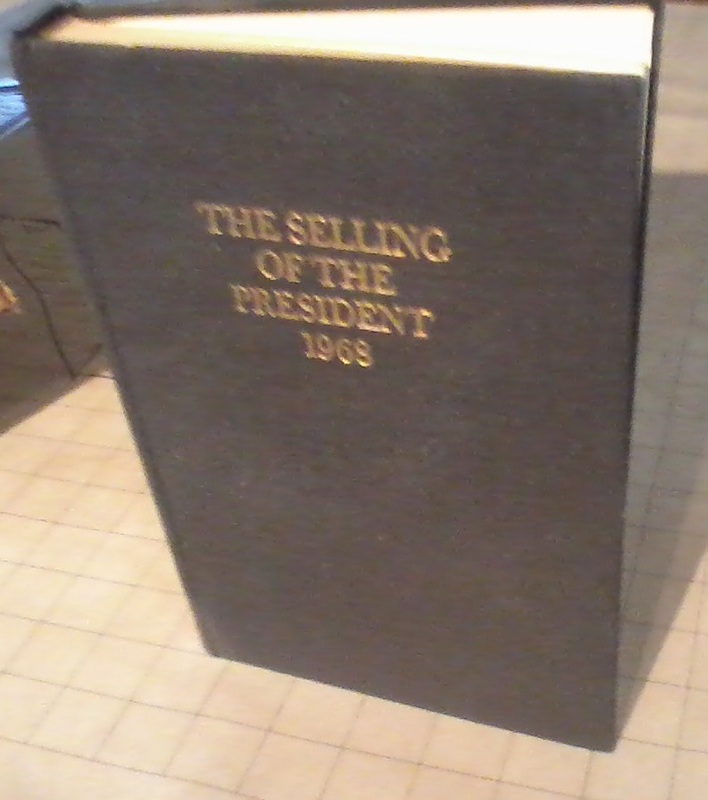A common question presented to free-market anarchists is "Without government, who will break up evil corporate monopolies?" There's a million legitimate and complimentary answers to that question, and I intend to begin writing posts covering my favorites in the future, but most of those posts are going to wind up being derivative of Rothbard. So, I might as well provide my inspiration for my favorite answers:
|
I may be over-delivering on my promise of more Rothbard. Maybe I'll have to loosen my self-imposed restriction on Tom Woods resources so as to give readers a break from Rothbard and hardcore economics.
A common question presented to free-market anarchists is "Without government, who will break up evil corporate monopolies?" There's a million legitimate and complimentary answers to that question, and I intend to begin writing posts covering my favorites in the future, but most of those posts are going to wind up being derivative of Rothbard. So, I might as well provide my inspiration for my favorite answers:
A one-hour lecture (40-minutes-ish if you listen at an accelerated rate, gotta love youtube) on competition and monopoly and a foundational argument that corporate monopoly can only exist when someone has a monopoly on force (you know, government). Of course, it's Rothabrd himself, demonstrating first principles in his charming and concise way.
0 Comments
In the spirit of Rothbard, Walter Block presents a treatise on the relationship between crime and economic manipulation, semi-appropriate ethical indignation and the unintended consequences of using violence to try to prevent those ethically unappealing actions.
In Defending the Undefendable, Walter Block defends the heroin dealer, the speculator, the employer of child labor, and the man who screams "fire" in a crowded theater against accusations of economic perversity and harming the social order. He does so quite effectively. After reading this book, one who is educated in economics will have to seriously reconsider support of a minimum wage and legal prohibitions against child labor. The introduction, written by Rothbard himself, makes it clear that while the people defended in Block's book are heroes because of the role they play economically and the adversity they face in reducing the friction of a politically-controlled economic system, this is not a moral defense of the particular actions the people make. For instance, a heroin dealer could very well be a boon to the market and a hero in face of the evils of government while also perpetrating an immoral or unethical act (such as selling poison to people, even if it is a voluntary interactions). As compelling, concise, and informative as the book is as a whole, there is one chapter, however, that doesn't seem to belong. The defense of the "Male Chauvinist Pig" was less an economic defense of chauvinism and much more an incoherent and aggressive defense of feminist talking points, most prominent of which being the importance of abortion. This defense of abortion is actually inconsistent with a much more compelling case he makes later on in the case of defending "The Employer of Child Labor". All-in-all, though, this book is a must-read for anyone who believes in the free market but hasn't critically assessed their position on "the undefendable" as of yet, people who are genuinely interested in reducing crime and increasing the quality of life for the poor, and those that still believe that government violence can somehow improve the world. Each chapter is a few pages long, very direct and to the point. One can acquire the book for free in digital form from the Mises Institute, or purchase a hardcopy at Amazon. I strongly recommend that you do so.
I still haven't figured out how I feel about Adam Kokesh, the man. I know very little about his philosophical groundings, as well. However, this is a paradigm case of Nonviolent Communication in action.
If anyone read the book (or at least my post about the book) and was skeptical of how it could possibly work, here is Adam Kokesh turning what would have likely escalated to the point that somebody would die into a deep intellectual conversation in which someone was forced to address the shortcomings of their worldview.
DON'T TALK TO THE POLICE!!!
This may seem a little extreme and forceful, but as my facebook news feed demonstrates daily, and as any defense lawyer with five cents and any cop with a conscience will tell you, talking to the police is going to end in one thing: the government will have more evidence with which to charge you with a crime and lock you up. Yes, a recent resource suggestion showed a man talking to the police, and I gave him credit for it. However, those men know what they are doing, the cop has been trained by those people to know exactly what he can and cannot get away with, and all three of them were willing and able to go to jail for having that conversation. Are you willing to go to jail? Watch this lecture, given to law students:
A book written by Mark Corske was recently made into a pseudo-documentary film that is very well-produced and well- written. I strongly recommend that people watch the video on youtube. It's an hour long, but it can easily be played at 1.25X or 1.5X speeds. It gets a little choppy at 2X speed. It is well worth the time to anyone who has felt that "something isn't right" about the world they live in, and it's even thought-provoking to those who haven't.
Reading the book would be warranted, too. However, I feel that watching the youtube video for free is much less a commitment than buying and reading the book. There's also the issue of market forces... there is a certain AnCom vein that runs through this work, so one's money may be better spent on Rothbard or Hans-Hermann Hoppe.
If one hour is too long or someone doesn't want to watch a documentary, there is a third option to the documentary and book. Here is a 30-minute interview that covers pretty much all the same information and ideas, but without a cool soundtrack and powerful visuals.
A few months ago, I stumbled across this book at a thrift store. The title was provocative enough, and my very limited knowledge of post-World War american history informed me that it was probably about Nixon. Nixon has always intrigued me, but not enough to actually try to learn anything about him. I decided to correct that and bought this book for less than a dollar. The book describes, in detail, the experiences of the men involved in Nixon's television campaign leading up to the election that made him President. Why would an anarchist care about Nixon and how he became president? To be honest, some of it is just morbid fascination with how we got to where we are. The reason I am suggesting you read it, though, is because it serves as an excellent exposition as to how, exactly, television has altered our society as a political body and the new methods of advertising that removed any semblance of intelligence from the electoral competition.
The first half of the book is the actual story, while the second half of the book is a massive collection of the documents from the actual election team, which are even more interesting than the story, in my opinion. I wrote a post about paradigmatic awareness a while back. I wrote it while editing a couple chapters in my book. Those chapters were concerned with epistemic rigor and the manner in which one can rightly approximate knowledge using experience, logic, and thresholds of doubt. I believe such things to be more important than nearly any other human faculty. Because my book is not yet completed or published, I will share someone else's work which is similar, if not quite as deliberate, to those chapters. The Voluntary Life Podcast has a three episode series titled "How to Think for Yourself": Part 1 is concerned with why methods of reason are important to rational creatures and begins to address the difficulties in establishing a method of reason. Part 2 is concerned with a brief overview of the scientific method, philosophy of science, and their relationship to epistemology. Most important, it explains the requirements for epistemic confidence. Part 3 is concerned with a priori reasoning and the relationship between reason and freedom. It's encouraging to see someone else produce work that is so similar to my own, in that it makes me feel a little less crazy. The differences between the two are also encouraging, as it makes me feel I have something to contribute to the conversation. I am considering different distribution methods for my book. Feel free to read more about it here.
All documentaries ought to have a "Based on a True Story" title card that they show at the start because, obviously, they are a movie like any other. They are trying to tell a story with a beginning, middle, and end with a compelling narrative that keeps people watching. As such, there is a lot of editing of reality, simply to fit a subject that spans the expanses of the human experience into a couple hours of film. What gets shown and not shown is ultimately the editor's choice, so one ought to be skeptical of a documentary and use it as a chance for starting an internal dialogue about an unfamiliar subject.
This documentary does a pretty good job of playing the middle-of-the-road as much as a documentary can, and it's fun to watch. It's about subliminal messages. While it's a little bit dated, so some of it's information is no longer accurate, it is still a fun watch which should encourage one to be selective in the entertainment.
There is a liberty-oriented radio show that plays daily for a few hours. It is syndicated on something like 150+ radio stations around the globe, including Africa. It's called Free Talk Live, and every episode is posted on youtube after the broadcast concludes. They also have a podcast feed that plays all the episodes (on the left side of the homepage).
Full disclosure, I do not really enjoy listening to Free Talk Live. I find it to be repetitive and elementary (and certain personalities on the show really get on my nerves). Of course, this is because I'm already neck-deep in libertarian culture... the show is played nightly on something like 150+ broadcast stations around the globe, including Africa and brings the message of liberty to thousands of people that would otherwise never hear something outside the 3x5 index card of educational talking points they learn at school and on TV. It's a part of the Liberty Radio Network, which does so much for bringing the message of liberty to people. I used to listen to Sunday episodes with Brian and Stephanie (of Sovryn Tech) before they moved on to bigger and better careers and Wednesday nights with Christopher Cantwell before he got suspended for arguing with a liberal on twitter. After Cantwell's suspension, viewership numbers dipped. Now that he is back, people ought to do what they can to boost those numbers back to their original magnitude, if not beyond. Cantwell provides an essential service in the libertarian culture, as a watchdog against corruption in the "movement". Of course, those that find themselves attacked by Cantwell have substantial resources to bring against him; this results in a need for more people to support him free-market-style. So, this is a combination resource suggestion and call to action. Please watch and like this video, amongst the others that Cantwell will be a part of in the future. Who knows, maybe you'll learn something along the way.
This is how police should treat people... and how people should treat police.
One of the single greatest reasons I intend to move to New Hampshire is this: A few guys (some openly carrying guns) take chalk and write polite but firm anti-cop messages all over the sidewalk in front of the police station. Instead of coming out, beating, and arresting these men, a solitary officer comes out for a nice lunch-break chat about how government is an unnecessary evil. In many other places around the country, as mentioned in the video below, people would be executed on the spot simply for having a gun, let alone writing chalk messages in front of a police station. Like Cantwell, I believe that if someone, anyone is attempting to rob, murder, or coerce you, you have an obligation to stop them at any cost. However, if someone is dressed like a criminal but not attempting to commit a crime against you, then you have an obligation to at least give them a chance. This video demonstrates this second situation perfectly.
I really don't know why liberty people don't want Cantwell around. He can be coarse, but the Truth is coarse. He sticks to the fundamentals because, without fundamentals, you can't go anywhere good. When it comes down to it, Cantwell has accomplished more for freedom by chalking sidewalks, pointing guns at drunks, and having cops out for coffee than everything done by Jeffrey A. Tucker or Austin Petersen combined.
https://youtu.be/Uqoh_xRYGuM |
Archives
October 2015
Categories
All
|




 RSS Feed
RSS Feed
